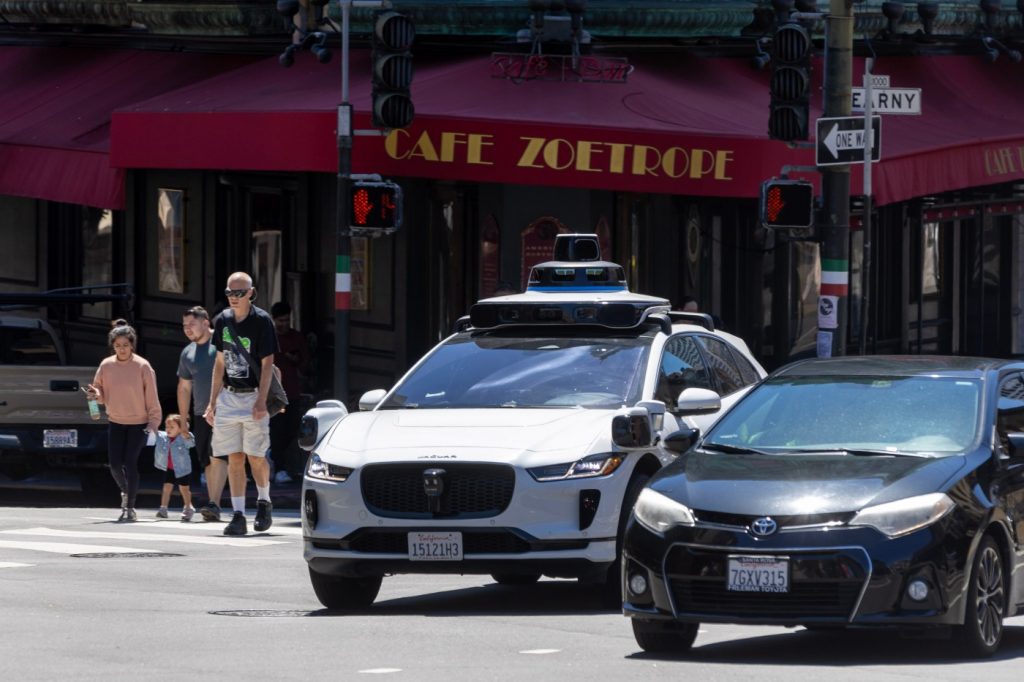Drivers navigating traffic on El Camino Real could soon have new cars to contend with, but no one to direct their road rage at: Driverless cars are coming to the Peninsula.
Autonomous vehicle company Waymo is set to begin testing its robotaxis along the Peninsula in the next few weeks, the first step in the company’s plans to eventually expand its service areas all the way to Sunnyvale.
Related Articles
US probe wants to know if Tesla Autopilot recall did enough to get drivers to pay attention
Editorial: Here come the robotaxis, and Bay Area communities can’t do a thing. This must change
Tesla enlists Apple to prove Bay Area driver in fatal crash was gaming
Waymo’s request to expand driverless robotaxis to the Peninsula approved
San Mateo County opposes Waymo’s driverless-car expansion
The pilot program will only be available to Waymo employees at first, who will be able to order “rider-only” trips anywhere from San Francisco down to the border of San Mateo and Burlingame.
“The Peninsula is our home — we want to bring the tech down the Peninsula, both because it’s a good market, and it’s where we all want to use it,” said Waymo Product Manager Chris Ludwick.
Waymo, which is based in Mountain View and owned by Google parent company Alphabet, began operating a fleet of robotaxis in Phoenix in 2020. It expanded its service to San Francisco in August 2023 for a limited group of users, though hundreds remain on a waitlist for access. The company runs tens of thousands of rides each week, Ludwick said.
Throughout the Peninsula pilot, Waymo continues to test its driver-accompanied vehicles in rides as far south as Sunnyvale.
Just like in San Francisco, Waymo’s “rider-only” cars will be limited to surface roads — meaning they won’t be able to hop on Highway 101 just yet. Also off-limits is the San Francisco International Airport — though the company remains in conversation with city officials about eventually bringing service there. (Waymo’s Phoenix service area already includes the city’s airport.)
Deployment of autonomous vehicles in San Francisco has not always gone smoothly. In August, nearly a dozen robotaxis from competitor Cruise blocked a street in North Beach, bringing traffic to a halt. And in February, a crowd in Chinatown set a Waymo car on fire.
It was only a matter of time before Waymo announced a pilot in the Peninsula. In January, the company submitted an application to the California Public Utilities Commission, which regulates commercial passenger vehicles, to expand its services south beyond San Francisco. The agency approved the request.
The CPUC’s move ignited a fight between the state and local authorities, who want the authority to decide whether self-driving cars can operate on their roads.
Dave Canepa, vice president of the San Mateo County Board of Supervisors, is among those protesting the arrival of autonomous vehicles.
“Why would any city or county allow robotaxis to operate unfettered when they are proven to be disruptive to first responders and even deadly?” Canepa previously told this news organization. “What is needed is local control and not the blanket approval the DMV and CPUC has taken.”
The fight is moving to the California State Legislature, too. In January, state Sen. Dave Cortese, a San Jose Democrat, introduced Senate Bill 915, which would give local governments the power to permit and regulate autonomous vehicles. The bill is set for a hearing before the Appropriations Committee on May 6.
Ludwick said that Waymo is in regular communication with local governments and law enforcement officials.
“When we expand anywhere, we take our time to do it,” Ludwick said. “I’m optimistic that we’re going to have good performance here and scale this up in the future.”


